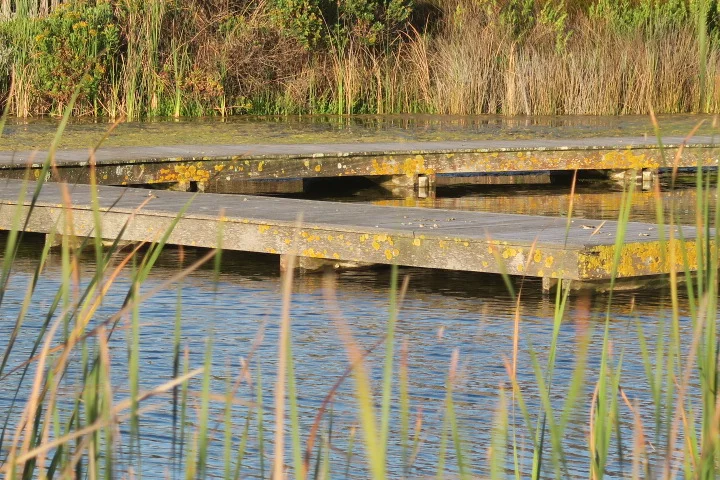1001 ways to stave off Day Zorro*: Roundup #2 and neighbourliness
We can build bridges across the water (crisis). Truly we can.
Well. That was a week in which we saw the best and the worst in Capetonians. Water-queue fisticuffs, people running hosepipes into their newly acquired rain-tanks, flint-faced men taking water from springs to sell: and it’s still two months to Day Zorro.* But also outbreaks of communal spirit, creative entrepreneurship, and SO MANY new tips flowing in (ha) on how to save water, harvest it, live more wisely with it.
During apartheid years, street committees supported individuals and organised action – all in the days before cellphones and emails. Capetonians are rustling up those skills all over again, and among the best tips I’ve received this week are on how to organise a Neighbourhood Water Safety Net. The basic principles involve lowering the drawbridge as opposed to retreating behind our walls.
22. So once more, with feeling: be a good neighbour. In reports on the water crisis in Brazil’s Sao Paulo (which was in fact the first major city to have its taps turned off), some commentators noted that a creeping disaster turned people against each other, as opposed to a sudden disaster (tsunami, earthquake, etc), which tends to pull people together. And this is related to the next tip:
23: Blame is pointless. Yes, I find myself frothing as the City blunders from one PR gaffe to another. I get furious thinking of all the years I’ve watched people stick their heads in the sand about the coming Watergeddon, who are now panicking and queuing at Woolies to scrum for bottled water and wailing because the waiting list for Jojo tanks reaches halfway to Jozi. IF YOU COULD READ, YOU ALL KNEW THIS WAS COMING. But much as I want to jump up and down shouting “You didn’t bloody listen, I started preparing for this EIGHTEEN MONTHS AGO,” there are better uses of time and energy.
So I’ve adapted the next few tips from a friend who’s been running an extremely successful Neighbourhood Support/Watch system for years, which has been able to switch effortlessly into a Water Network.
24. Plug into an existing structure, such as a neighbourhood watch scheme, if possible. Establish where its boundaries lie, so as to eliminate gaps and overlaps. Meet with others in your suburb or complex or estate with maps, if necessary. Make sure everyone at every address is accounted for.
25. Pick one central means of communication, with cellphone/WhatsApp back-up. Email is a bit laborious, but it’s better for the elderly, who aren’t necessarily au fait with social media. There is also one huge advantage to email: it’s less likely to generate trollery, racism, conspiracy theories, etc, as people have time to think a bit before reacting, and their own names are attached to their mails. But start the old-fashioned way: a letter delivered to every home. A few volunteers will need to do the admin in collecting everyone’s email addresses and cell numbers and generating a list.
26. Ask people to share information about their water resources/resilience. Are those with (unstressed) boreholes, wells, big rain-tanks and pools prepared to share water with people and families who are clearly vulnerable (the elderly, the unwell, single parents, those with no money for water-harvesting and water-saving devices, families with small children, etc)? See what capacity you have if resources in your neighbourhood are pooled (sorry, cannot get away from watery puns). You may find that if everyone is super-thrifty about water and generous about sharing it (especially in wealthier or less built-up areas, where it’s easier to install tanks and swimming-pools are plentiful), you might not have to queue for water.
27. But if you do, establish networks for those as well. Who has transport? Who has the physical ability to carry? Who works flexitime or is their own boss? Who would be prepared to collect water for others? Don’t guilt or shout anyone into agreeing to do this: ask mildly who has what resources and wait for them to volunteer. I think we’re going to be pleasantly surprised.
28. It has been pointed out about a hundred times by now that if every residential building in Cape Town harvested rainwater efficiently off the roof, it would meet our need for domestic use almost entirely, and we would not now be in this pickle. So gently suggest that to avoid this kind of crisis every time we have poor winter rains, people think long-term about fitting up their homes or complexes for water-harvesting.
29. I personally am allergic to committees, but you will probably need to form one to deal with awkward and tense situations: Mr Twitwiddle down the road has been sneaking his hosepipe into his pool; Dr Leakey has been spiriting away water from the tank installed at her block of flats to keep her roses going, and so on. I don’t know what the solutions to human selfishness are (if you have the secret, PLEASE share), but one rough rule of thumb that re-established order at a local spring: each person could take 25 litres at a time ON FOOT ONLY. Lugging that around goes some way to curbing water abuse. Further hint: take cake to all potentially tricky committee meetings. I know carbs are supposed to be the enemy, but they DO have a tranquilising effect.
Tips related to responding thoughtfully and with kindness on community networks:
30: Please, please, please don’t share fake news via social media. I know there’s an atmosphere of panic, but still. Never share a link on the basis of the headline alone. Never share a report that doesn’t include the actual original documents supporting the claim. There was distress this week about proposed water by-laws that assumed we were all going to have to “get permission” to install rainwater tanks. It didn’t help that the language of the actual proposed legislation was woolly, unclear and open to misreading, so that’s the next tip:
31: Dear authorities, everything you communicate to a frightened populace about the water crisis needs to be in Plain English, absolutely clear and simple to grasp. In the UK, by law, all public information has to be easy to read and comprehend: please catch a wake-up call. (Everything I’ve seen so far from you Has Needed Editing. Bit of an in-joke. I’m an editor by trade.)
32. Don’t get angry or self-righteous about people who need water for their animals. Every time this comes up on social media, there’s indignation about “caring more for animals than human beings”. Please use a little imagination: what is one supposed to do when animals are experiencing thirst and dehydration? Say “Sorry, we were mind-blowingly selfish and stupid not to plan for this, and now I’m going to watch you suffer on principle, because, you know, humans are more important”? And I say this in the knowledge that some farmers, especially indigent ones, had to watch their livestock (and their livelihoods) die during the recent Free State drought, and it is likely happening down here, too. Unbearable to contemplate.
33. Likewise, putting out a tiny bit of your water allowance each day for birds and insects is not a hippy-dippy luxury. No birds and bees = NO FOOD. It might be time for a refresher course in the vital role of pollinators in our food chains.
Bee meets butterfly.
Now back to laundry (I was clearly a washerwoman in a previous life):
34. I’ve already mentioned that visitors to Cape Town should bring their own sheets, and take them away again for washing. Make arrangements for this ahead of time with your hotel, host or guesthouse.
35. Guesthouses could offer this option on their booking websites: offer a small discount or a reward to visitors who bring their own linen.
36. In the further interests of lowering the laundry load, one of the best tips I spotted was the decision by some schools to let pupils come to school in gym clothes for the duration (appropriate where kids have PE outfits – not every family has the budget for this). Another option would be to allow pupils to wear T-shirts with their pants or gym-slips instead of shirts that need daily laundering.
37. Businesses should be doing this too: every industry that requires staff to dress in a professional uniform for reasons other than safety (banks, call centres, etc) should issue staff with branded T-shirts that they can wear for the time being, and once it gets colder, tracksuits to replace professional outfits (those white shirts!) that need regular washing and ironing.
38. The above two tips might take a bit of planning, but something every business and school could and should announce TOMORROW: unless you need closed shoes for safety, everyone who wants can wear sandals or flip-flops to work. NO MORE SOCK WASHING.
And about laundering your own person:
39. Adapt your personal grooming/beauty/hygiene routines so that they’re water resilient. I’m seeing a lot of folk sporting beautiful new shorter hairdos, plus beards sprouting everywhere. Beards are an excellent idea, and those with lady-gardens might consider dispensing with their, um, foliage (via electric shavers and waxing), given that we’re all showering less.
40: Tiny and probably silly tip, but I use only mint/tea-tree/fir/eucalyptus shower gels and soaps, and it just makes me feel cooler.
In the interests of continuing to support local businesses:
41: Take your own travel mug, water and ice (in a thermos) to restaurants and coffee-shops. Trust me, they are GRATEFUL when you do this.
42: Hurrah to the local restaurant I spotted online today that is going to be serving meals on biodegradable plates. (Look, it’s not an ideal solution, but the need to save water trumps all.)
43. One of my favourite waitresses tells me that certain items are coming off menus just because they’re too water-intensive to prepare. Be mindful of jobs like hers: she tells me that some customers are still making wasteful requests for water, the worst offence being asking for water that then goes undrunk.
44: For those who are able to go off the grid, it’s no good being smug about this if you’re still using the toilet or generating dishes to be washed when you’re out and about. If you have well or spring water or a rain-tank, lug along 5 litres of water everywhere you go. If you don’t need it, leave it in the toilet. Someone will love you for it.
45. Speaking of those plastic 5-litre water containers, here’s a very handy link on how to avoid creating a landfill nightmare or overwhelming recycling centres. There are also small businesses and NGOs that need these bottles for their repurposing ventures: here’s an example.
46. Woolworths, I’d like a word. Presumably you sell salad, fruit and veg that is prepared to high standards of hygiene. What is this “rinse before using” on your packets? If it’s based on the tiny chance that there is still a grain of sand in the spinach, we are grown-ups and we are not going to fuss. Ditch this instruction, please.
47. If your business is water-resilient because you have a well or similar, consider time-sharing with colleagues dependent on municipal water. A hairdressing salon or graphic design studio with a well could operate from 9-3, then have colleagues come in from 3-9. People really do need to keep their jobs.
OK, I was going for 50 tips, but this is already way too long (a good sign, I guess). So I will close with this wonderful tip from someone I have dubbed the Teabag Elf – who is also responsible for the phrase “Day Zorro”.
48: Use damp teabags to wipe dirty plates and dry teabags to polish them further. My friends in catering have all confirmed that this is by far the best method to get the worst of the grease off pots, pans and plates, also to mop up cooking-oil spills. And the teabags can go straight into the compost afterwards.
49. Just for luck: don’t panic.
And once again:
50: DON’T PANIC. In the words of Good Neighbourhood Network Guy referred to above: “Our community is on a path to a shared solution and one that brings people together to care for the most at need and then the collective – very cool outcome for a crisis.”
Looking after each other. Because the alternative is unthinkable.



